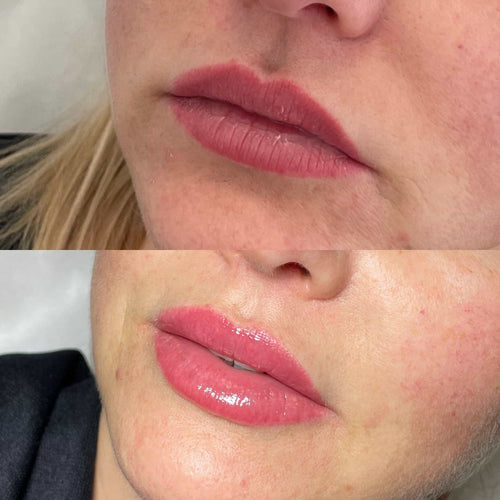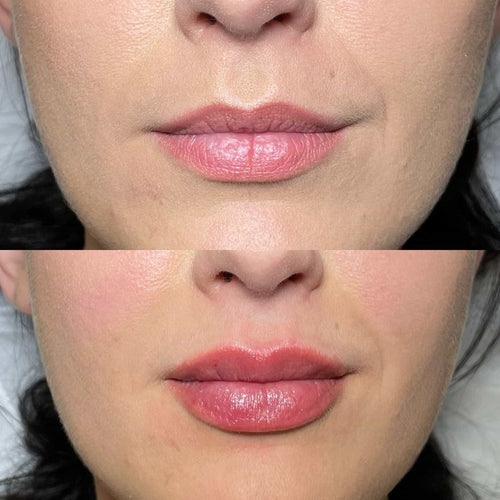What Is The 5 Year Face Filler?
Reserve a Dermal Filler Session with Dr. Laura Geige Now
What is it?
A Volumetric Approach
A “5-year face filler” is a term used to describe a technique in facial aesthetic treatments that aims to restore lost volume and achieve a more youthful appearance.
This approach often utilizes **dermal fillers**, which are injectable substances composed of hyaluronic acid or other biocompatible materials. Hyaluronic acid is naturally present in the skin and helps maintain its plumpness and elasticity.
The goal of a “5-year face filler” treatment is not merely to fill wrinkles but to address deeper **volume loss** that occurs with age. This includes restoring fullness to areas such as the cheeks, temples, jawline, and lips.
This **volumetric approach** differs from traditional wrinkle fillers, which primarily target superficial lines and creases. By adding volume strategically, the “5-year face filler” technique can lift and contour facial features, creating a more balanced and harmonious appearance.
Schedule Your Dermal Filler Consultation with Dr. Laura Geige Today
The treatment typically involves injecting fillers in multiple layers beneath the skin’s surface, mimicking the natural contours of youthful facial structures. The amount and type of filler used vary depending on individual needs and desired outcomes.
Arrange a Dermal Filler Consultation with Dr. Laura Geige Today
Long-Lasting Results
The “5-year face filler” refers to a hyaluronic acid-based dermal filler designed for long-lasting results, typically lasting anywhere from 18 months to 3 years.
This type of filler differs from traditional fillers due to its unique composition and injection techniques. These factors contribute to a more enduring outcome, potentially reducing the need for frequent touch-up appointments.

Here are some key aspects of “5-year face fillers”:
-
Hyaluronic Acid: Like other dermal fillers, “5-year face fillers” primarily utilize hyaluronic acid (HA) as the active ingredient. HA is a naturally occurring substance in the skin that helps maintain hydration and volume.
-
Cross-linking Technology: The secret to their longevity lies in advanced cross-linking technology. This process creates stronger, more stable bonds between HA molecules, resulting in a longer-lasting effect compared to traditional fillers.
-
Specialized Injection Techniques: Proper placement and injection techniques are crucial for maximizing the longevity of “5-year face fillers.” Experienced injectors utilize precise placements within specific facial layers to achieve optimal volume and support.
“5-Year Face Fillers” can be used to address a variety of concerns, including:
-
Volume Loss: Replacing lost volume in cheeks, temples, and jawline.
-
Facial Contouring: Defining facial contours and creating a more sculpted appearance.
-
Wrinkle Reduction: Smoothing out moderate to deep wrinkles and folds.
It’s important to note that individual results may vary depending on factors such as skin type, lifestyle, and the specific product used. Consultation with a qualified aesthetic practitioner is essential to determine if “5-year face fillers” are right for you and to discuss realistic expectations.
Candidates & Considerations
Who’s a Good Fit?
Determining the “best” candidate for any aesthetic procedure, including 5-year hyaluronic acid fillers, involves a careful assessment of individual factors and considerations.
First and foremost, a thorough medical history review is crucial. This helps identify potential contraindications or risks associated with dermal filler injections, such as allergies, bleeding disorders, or active skin infections.
Realistic expectations are paramount. Patients should have clear understanding of what 5-year fillers can achieve, emphasizing the potential for long-lasting results but also acknowledging the possibility of some gradual resorption over time.
Facial anatomy plays a significant role in treatment planning. Different areas of the face respond differently to filler injections, and experienced injectors will tailor the approach based on individual features.
Skin type and quality are also important considerations. Individuals with thinner or more sensitive skin may require a more delicate injection technique and potentially different types of fillers.
Lifestyle factors such as sun exposure, smoking, and hydration habits can influence filler longevity and overall skin health. Addressing these factors pre-treatment can contribute to optimal outcomes.
Consultation is key. Open communication between the patient and injector allows for a personalized assessment, discussion of goals, potential risks and benefits, and establishment of realistic expectations.
Ultimately, choosing a qualified and experienced injector with expertise in 5-year fillers is essential. Look for board-certified plastic surgeons or dermatologists who prioritize safety, artistry, and individualized treatment plans.
Understanding Risks & Side Effects
When considering any aesthetic procedure, it’s crucial to thoroughly understand the candidates, potential risks, and side effects associated with it. This is especially important for procedures like facial fillers, which are designed to temporarily augment specific areas of the face.
“5-year face filler” likely refers to dermal fillers that utilize hyaluronic acid (HA) gel as their primary component. These HA fillers are particularly popular due to their reversible nature and ability to provide long-lasting results.
Suitable candidates for 5-year face fillers typically have good overall health, realistic expectations, and understand the temporary nature of the treatment. They may be seeking to address moderate to severe facial wrinkles, restore volume loss in areas like cheeks or lips, or contour specific features.
However, certain individuals may not be suitable candidates for this procedure. People with active skin infections, allergies to HA or other filler ingredients, bleeding disorders, or a history of keloid scarring should avoid 5-year face fillers.
Like any medical procedure, 5-year face fillers carry potential risks and side effects. Common side effects include temporary redness, swelling, bruising, tenderness, and itching at the injection site. These usually subside within a few days to a week.
More serious, albeit less common, complications can occur, such as infection, vascular occlusion (blockage of blood vessels), or filler migration. It’s essential to consult with a qualified and experienced practitioner who understands these risks and takes necessary precautions to minimize them.
Before undergoing any facial filler treatment, patients should have a comprehensive consultation with their chosen provider. This allows for a thorough assessment of their medical history, goals, and expectations, as well as an opportunity to discuss potential risks and benefits in detail.
Procedure & Aftercare
The Injection Process
The “5 Year Face Filler” refers to a popular, yet somewhat misleading, term used to describe dermal fillers that are designed for longer-lasting results than traditional hyaluronic acid fillers.
These fillers typically utilize different types of hyaluronic acids or other biocompatible materials with slower degradation rates.
Here’s a breakdown of the procedure and aftercare involved:
- Consultation and Assessment: A thorough consultation with a qualified medical professional is essential. This involves discussing your aesthetic goals, medical history, and any allergies or medications you are taking.
- Preparation: The area to be treated will be cleansed and disinfected. Numbing cream may be applied to minimize discomfort during the injection process.
- Injection Process:
- A fine needle or cannula is used to inject the filler into specific points beneath the skin.
- The exact placement and technique vary depending on the area being treated and the desired outcome.
- Aftercare Instructions: Your practitioner will provide detailed aftercare instructions tailored to your individual needs. These typically include:
- Avoiding strenuous activity, heat, and direct sun exposure for several days.
- Applying ice packs to reduce swelling and bruising.
- Keeping the treated area clean and moisturized.
- Returning for follow-up appointments as recommended to monitor results and address any concerns.
It’s important to understand that while “5 Year Face Fillers” can provide longer-lasting results than traditional hyaluronic acid fillers, they are not permanent. Results gradually diminish over time, and touch-up treatments will eventually be needed to maintain the desired appearance.
Always consult with a board-certified dermatologist or plastic surgeon to discuss your individual needs and expectations.
Recovery & Maintenance
Dermal fillers are injectables designed to add volume and plumpness to facial areas, reducing the appearance of wrinkles and restoring lost contours.
There are various types of fillers available, each with different compositions and properties. Popular choices include hyaluronic acid (HA) fillers, which attract and hold water, providing a natural-looking lift, and poly-L-lactic acid (PLLA) fillers, which stimulate collagen production for long-lasting results.

When considering a 5-year face filler, it’s crucial to understand that such a product doesn’t truly last for five full years. Instead, the term likely refers to fillers with extended longevity compared to traditional HA fillers, often lasting up to 18 months or longer.
These longer-lasting fillers may use advanced technologies or unique formulations to provide more prolonged results. For example, some PLLA fillers are designed for gradual volume increase over several weeks, leading to a sustained effect.
The procedure involves injecting the filler into specific facial areas using fine needles. A qualified and experienced injector will determine the appropriate placement and amount of filler based on individual needs and desired outcomes.
Aftercare following a facial filler treatment typically includes avoiding excessive sun exposure, strenuous activities, and rubbing or massaging the treated area for several days. Staying hydrated is essential to support the filler’s effectiveness.
Recovery is usually quick, with minimal downtime. Some individuals may experience mild swelling, redness, or bruising, which typically subside within a few days to a week.
Maintenance involves follow-up appointments with the injector to assess results and determine the need for additional filler injections. The frequency of touch-up sessions will vary depending on individual factors such as age, skin condition, and lifestyle.
It’s important to consult with a board-certified dermatologist or plastic surgeon experienced in facial fillers to discuss expectations, risks, and potential complications before undergoing any treatment.
Decléor Direct Alabama Sig Delt Bronzed Body Spray Tan
- How To Take Kratom Capsules Safely And Effectively - May 24, 2025
- Nu-Derm Skin System Near Horsell, Surrey - May 24, 2025
- Vista Edge Vape Vs Yocan Uni: Which One Offers Better Performance? - May 23, 2025
